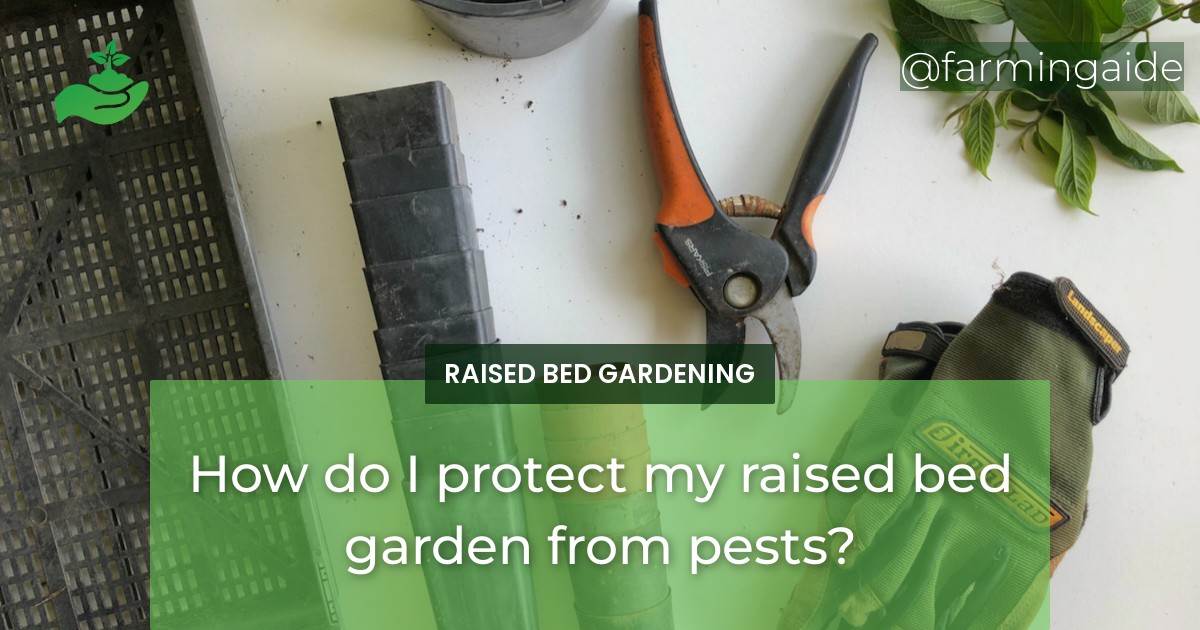Protecting a raised bed garden from pests can be a daunting task, but with the right pest management techniques, you can prevent and control pest infestations to keep your plants healthy and thriving. In this article, we will explore the various pest prevention and control strategies that you can employ to protect your raised bed garden from pests.
Which Type of Gardening is More Susceptible to Pest Attacks, Raised Bed or In-Ground?
When comparing raised bed gardening pros to in-ground gardening, one consideration is pest susceptibility. Raised bed gardens may be less susceptible to pests like slugs and snails, as the elevated beds can make it more difficult for these creatures to access the plants.
Pest Prevention and Control Strategies for Raised Beds
Identify Common Raised Bed Garden Pests
The first step towards protecting your raised bed garden from pests is identifying the common pests that are likely to infest your garden. Some common raised bed garden pests include:
- Aphids
- Spider mites
- Caterpillars
- Slugs and snails
- Whiteflies
- Thrips
- Leafhoppers
- Mealybugs
Prevention Strategies for Raised Bed Garden Pests
Cleanliness and Sanitation
Keeping your raised bed garden clean and free from debris is an effective way to prevent pest infestations. Regularly remove fallen leaves, weeds, and other plant debris that can provide hiding places for pests.
Companion Planting
Companion planting is another effective way to prevent pest infestations in your raised bed garden. Some plants, such as marigolds, basil, and garlic, have natural pest-repelling properties that can help keep pests away from other plants.
Crop Rotation
Rotating your crops is an effective way to prevent pest infestations in your raised bed garden. Planting the same type of crop in the same spot year after year can attract pests that feed on that particular crop. By rotating your crops, you can disrupt the pests’ life cycle and reduce their populations.
Natural Repellents
Natural pest repellents, such as diatomaceous earth and hot pepper spray, can be used to deter pests from your raised bed garden. These natural repellents are safe for plants and can be an effective way to keep pests away from your garden.
Control Strategies for Raised Bed Garden Pests
Handpicking
One of the simplest ways to control pest infestations in your raised bed garden is by handpicking pests off your plants. This method is best used for larger pests, such as caterpillars and slugs.
Traps
Traps can be an effective way to control pest infestations in your raised bed garden. Sticky traps can be used to catch flying insects, while beer traps can be used to catch slugs and snails.
Insecticidal Soaps
Insecticidal soaps can be used to control soft-bodied pests, such as aphids and whiteflies. These soaps work by suffocating the pests and can be an effective way to control pest infestations.
Neem Oil
Neem oil is a natural insecticide that can be used to control a wide range of pests in your raised bed garden. This oil works by disrupting the pests’ life cycle and can be an effective way to control pest infestations.
Bacillus Thuringiensis (BT)
Bacillus thuringiensis (BT) is a natural pesticide that can be used to control caterpillars in your raised bed garden. This pesticide works by paralyzing the pests’ digestive system and can be an effective way to control pest infestations.
Pyrethrin
Pyrethrin is a natural pesticide that can be used to control a wide range of pests in your raised bed garden. This pesticide works by disrupting the pests’ nervous system and can be an effective way to control pest infestations.
Conclusion
Protecting your raised bed garden from pests requires a combination of prevention and control strategies. By identifying common pests, practicing good sanitation, and using natural pest control methods, you can prevent and control pest infestations in your raised bed garden.


